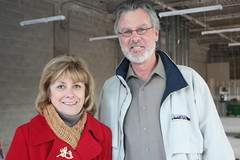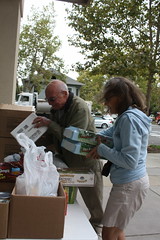Second in a series
When faced with a crisis, we are buoyed by a burst of adrenaline. But once the moment passes, we come back down to earth and brutal reality. For the person closest to the tragedy, Eileen Thomas, executive director, it also meant nights when sleep would not come, or when the night would end too soon, interrupted by a mind overloaded with mental lists of what needed to be done next.
The response from the community was gratifying, but posed a challenge. Donors needed to be thanked. Businesses who offered in-kind donations and other support needed to be called back. Organizations and individuals who wanted to sponsor canned food drives over the holidays needed bins, information about what to collect and when to wrap up the drive, and often, someone to pick up donated items.
River City Food Bank had no phones, no stationery, and no canned food collection bins. Those had all burned, along with the holiday newsletter that was about to be mailed, signs and brochures.
This was no ordinary time to lose materials. Holiday appeals traditionally brought in 30-40% of RCFB’s operating funds for the entire year. And canned food donations from holiday drives had become an important supplement to the agency’s budget.
Our small staff of three — the executive director, a program manager and a food stamp outreach coordinator — was stretched in the best of times, but not up to handling the overnight expansion of work that had to be completed. The crunch left Eileen and the Board worrying about how RCFB would:
- set up a temporary “street” operation so that needy people would not go hungry
- get out its holiday appeal letters
- restore its fund development database, which held the records of all individual and corporate donors
- develop a space plan for the temporary space that Sutter had offered, and get permitted by the City to operate there
- find an affordable semi-permanent location for its use going forward
- keep plans for its major fundraiser, Empty Bowls, on track
In an emergency strategic planning session on October 30, the Board of Directors developed a “guerrilla” operating plan to address two fronts: immediate re-establishment of operations, and longer-term purchase or lease of a building that would be RCFB’s home for the foreseeable future. Among other actions taken by the Board, Eileen was encouraged to hire an assistant.
 Richard Sambucetti of Borges Architectural began putting in what became hundreds of hours helping RCFB to figure out how to make the temporary Sutter space as functional as possible, while minimizing costs to improve the space. He led the lengthy process of securing a building permit from the City of Sacramento.
Richard Sambucetti of Borges Architectural began putting in what became hundreds of hours helping RCFB to figure out how to make the temporary Sutter space as functional as possible, while minimizing costs to improve the space. He led the lengthy process of securing a building permit from the City of Sacramento.
Volunteers stepped in as temporary extensions of staff. Bernadette Kraft and Sheila Hard (Board member) took care of acknowledging gifts by preparing thank you letters. Pam Kepler, Board member, worked long hours depositing donation checks and keeping the organization’s accounting books accurate and current. Betsy Stone (author of this post) assisted with communications, including checking Google Voice for recorded messages that had come in to the agency’s main phone number — especially since donors and media were calling and needed immediate responses.
That old saying about “it takes a village” applies just as well to the challenge of re-establishing a nonprofit’s operation. It took a lot of work from a lot of people to handle the extra work, and preserve the organization’s commitment to put as much of its resources as possible into providing food for people in need.
 The day after the fire, a man rolled up in his wheelchair. One of the volunteers asked him if he was there to donate. No, he said, he was hoping for food. He – and many others – hadn’t heard that River City Food Bank had burned. Another volunteer offered him $20 to enable him to buy food, but he refused – pointing at the bread and canned pork and beans that had been dropped off by one of RCFB’s supporters. He said he wouldn’t take the money, but a few cans of food would make a difference. It was a reminder that restoring RCFB was a matter of urgency. For many individuals and families, a 3-day emergency food supply makes the difference in very lean times.
The day after the fire, a man rolled up in his wheelchair. One of the volunteers asked him if he was there to donate. No, he said, he was hoping for food. He – and many others – hadn’t heard that River City Food Bank had burned. Another volunteer offered him $20 to enable him to buy food, but he refused – pointing at the bread and canned pork and beans that had been dropped off by one of RCFB’s supporters. He said he wouldn’t take the money, but a few cans of food would make a difference. It was a reminder that restoring RCFB was a matter of urgency. For many individuals and families, a 3-day emergency food supply makes the difference in very lean times.
Next: Mac & Cheese, the comfort cats
Posted by @philanthrophile, also known as Betsy Stone
Tip: If you’d like to keep up on the latest news about area hunger, RCFB’s efforts to rebuild or major events like Empty Bowls, subscribe to the e-newsletter by signing up on the website. Look for the email signup field, “Join our secure email list.”

